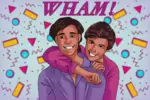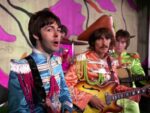“Yesterday” opens with a familiar scene: an aspiring musician is trying, and failing, to capture his listeners’ hearts with his undiscovered talent. Jack Malik, played by Himesh Patel, is that struggling musician before his life suddenly changes. Suddenly, the world experiences a 12-second, international blackout just as Jack is biking his way home, and he’s hit by a bus.
Upon waking up, he discovers he’s lost two teeth (unfortunately) and his scraggly beard (very fortunately). He makes a reference to the Beatles song “When I’m Sixty-Four” to his best friend/manager/roadie Ellie Appleton, played by Lily James, and the plot of the movie is promptly set into action — Ellie has no idea what he’s talking about because the Beatles have been erased from existence, and Jack seems to be the only one who remembers them.
To the shock and awe of his friends, Jack plays “Yesterday”; when they insist they’ve never heard it before, he frantically googles “The Beatles,” but he can only find information about the type of insect. A search of “John Paul George Ringo,” the four band members, brings up Pope John Paul II, and “Sgt. Pepper’s Lonely Hearts Club Band,” the title of one of the Beatles’ most famous albums, yields strange and irrelevant results. One hilarious montage later, Jack comes to understand what the audience has known the entire time — the Beatles are definitely gone.
Thus far, the movie has an interesting premise with a lot of potential: What are the ramifications of this event? What caused the blackout? Are we in an alternate universe now, or has the existing world been changed through some time-altering supernatural event? Was it an accident, or did some Beatles-hating super villain go to great lengths to remove them from existence?
More importantly to the plot, why does Jack appear to be the only one who remembers them? What happened?
These questions remain unanswered, much to the confusion and disappointment of the audience. “Yesterday” abruptly shifts focus, and, honest to God, the blackout is hardly mentioned for the rest of the movie. The world just moved on, and Ellie even lampshades this when she tells Jack about the global confusion after the blackout and the search for why it happened, which he (and the audience) conveniently missed because Jack was unconscious after the crash.
Moving forward, “Yesterday” focuses on Jack’s quest to write down every Beatles song he can remember so that they aren’t lost in this Beatles-less world, and the audience is treated to another montage of Jack’s anxiety and frustration as he tries to remember all the lyrics. “Eleanor Rigby” proves to be a challenge, but it’s hard to blame him for that.
But as Jack tries to preserve the Beatles from his own fallible memory, the audience is left wondering how the erasure of the Beatles impacted the rest of Jack’s world, which is, ostensibly, the entire premise of the movie.
The Beatles had a significant impact on music and pop culture, both in their own time and in the present day; there’s even a Wikipedia page dedicated solely to their cultural impact. How would pop culture be different without Beatlemania? Certainly, the music industry would be different without their influence. Did another band replace them, and if so, who? Was it someone who didn’t reach the heights of fame they could’ve without the absence of the Beatles, or someone who the band pushed out of the limelight entirely? “Yesterday” fails to answer any of these questions.
Instead, the movie decides to follow two different plotlines: Jack’s guilt over stealing the Beatles’ songs and his relationship with Ellie. This story, while rather cliché, is entertaining; the movie is comedic at the right times, and touching when it wants to be. Even with all these questions about the blackout and the erasure of the Beatles, the movie is sweet, as long as viewers are willing to suspend their disbelief.
However, even discounting its rampant plot holes, “Yesterday” feels like it doesn’t live up to its potential. The premise is intriguing, but the movie doesn’t explore it fully and falls back to a romance versus success plotline, with a side plot involving guilt and regret. The movie doesn’t explore the idea that the Beatles’ popularity wasn’t solely due to their songs, but also because of their personalities and band chemistry.
Instead, the movie mostly brushes aside this idea, only referencing it in a hilarious montage in which Jack has all the songs but no one pays attention to him — that is, until Ed Sheeran notices him and promptly boosts him to worldwide fame while calmly stepping aside because Jack is so much better than he is, leaving viewers to lament a missed opportunity for a side plot about professional rivalry and jealousy, which would have been fascinating in combination with Jack’s guilt over falsely releasing the Beatles songs as his own.
https://www.instagram.com/p/BziaAXMBGBy/
Furthermore, “Yesterday” just brushes past the idea that the Beatles’ songs might not have reached such heights of popularity if they had been introduced today. Some of them are quite dated — “Yesterday” references this when Jack plays “Back in the U.S.S.R.” when on tour with Sheeran in Russia. “U.S.S.R.,” of course, is a term that stopped being used before Jack was even born, so it seems odd that he’d use it in a song. It’s brought up again with the song “Hey Jude,” as “Jude” is a rather dated name, but except for the occasional comedic line, the idea that the Beatles gained fame because of when they wrote those songs is forgotten.
Jack’s audience is different from the Beatles’, and Jack has the advantage (and disadvantage) of social media, which the Beatles didn’t have, but this avenue, like many others in “Yesterday,” remains unexplored.
A particularly frustrating missed opportunity is when Jack dreams about being publicly confronted by Paul McCartney and Ringo Starr, the two surviving members of the Beatles, who come forward to accuse him of fraud and say that the songs are really theirs. When Jack wakes up from this nightmare, though, the audience has to give up any idea of a possible conflict between Jack and the Beatles who really wrote the songs, because, while Jack knows that he stole them, he doesn’t want to give up his dream. While this idea is touched upon later in the movie, “Yesterday” still fails to fully explore it in a way that would have made this movie great.
Thinking too hard about this movie will just drive viewers further down the rabbit hole of burning questions and missed opportunities, but if you can suspend your disbelief and just go with the flow, the movie is certainly charming, sweet and funny to watch. “Yesterday” may fail to fully explore its premise and potential, but it’s worth watching anyway.
















